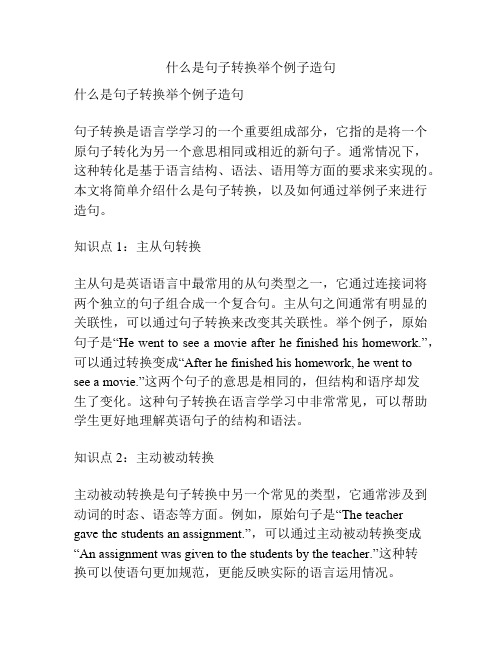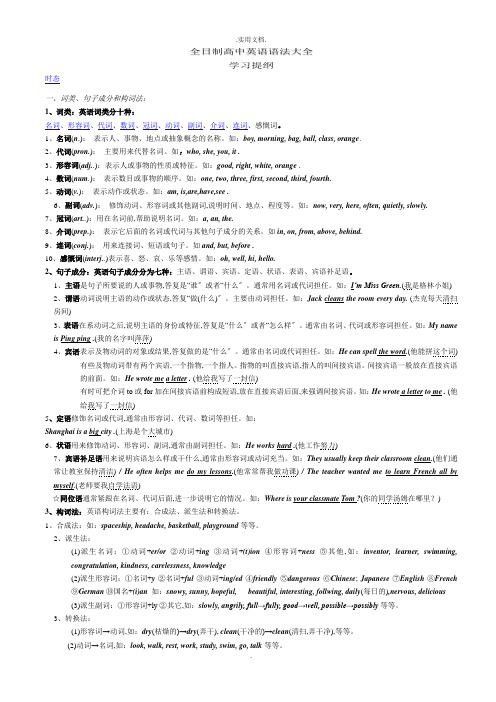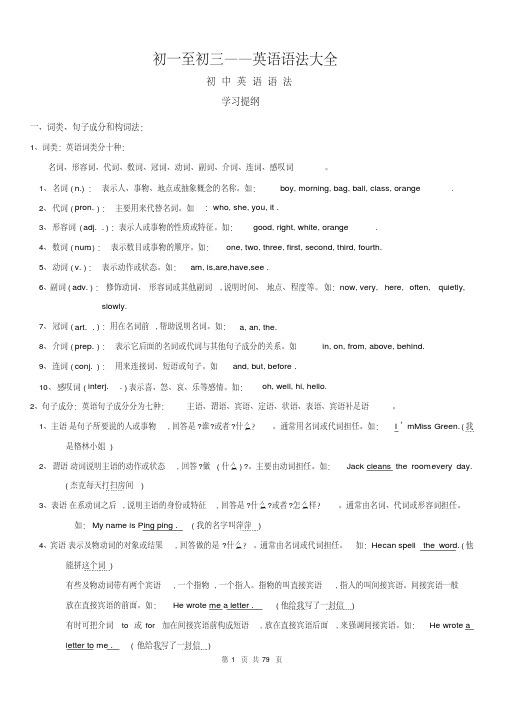最新-英语语法大全--句子的转换与合并 精品
什么是句子转换举个例子造句

什么是句子转换举个例子造句什么是句子转换举个例子造句句子转换是语言学学习的一个重要组成部分,它指的是将一个原句子转化为另一个意思相同或相近的新句子。
通常情况下,这种转化是基于语言结构、语法、语用等方面的要求来实现的。
本文将简单介绍什么是句子转换,以及如何通过举例子来进行造句。
知识点1:主从句转换主从句是英语语言中最常用的从句类型之一,它通过连接词将两个独立的句子组合成一个复合句。
主从句之间通常有明显的关联性,可以通过句子转换来改变其关联性。
举个例子,原始句子是“He went to see a movie after he finished his homework.”,可以通过转换变成“After he finished his homework, he went to see a movie.”这两个句子的意思是相同的,但结构和语序却发生了变化。
这种句子转换在语言学学习中非常常见,可以帮助学生更好地理解英语句子的结构和语法。
知识点2:主动被动转换主动被动转换是句子转换中另一个常见的类型,它通常涉及到动词的时态、语态等方面。
例如,原始句子是“The teacher gave the students an assignment.”,可以通过主动被动转换变成“An assignment was given to the students by the teacher.”这种转换可以使语句更加规范,更能反映实际的语言运用情况。
知识点3:比较级转换比较级转换是通过改变形容词的比较级来实现的,它可以改变比较级后面的名词或代词的顺序。
例如,原始句子是“My brother is taller than my sister.”,可以通过比较级转换变成“My sister is not as tall as my brother.”这种句式可以帮助学生更好地理解比较级的语法特点,进而提高英语的写作能力。
总之,句子转换是一种语言学习的重要手段,它可以帮助学生更好地理解英语句子的结构和语法,提高英语的写作能力。
(完整版)英语语法-句子的种类(史上最详细)

Let’s 和 let us 区别: Let’s 包括对方, let us不包括对方。 Let’s go .shall we. 咱么去吧,怎么样? Yes let’s /No let’s not . Let us go, will you? 让我们去吧,行吗?
(三) 感叹句
1.感叹句的概念 感叹句是表示喜怒哀乐等感情的句子,感叹句用感叹号 “!”。
(二)祈使句
祈使句表达说话人对对方的劝告、叮嘱、建议、请求或命令 等。主语you通常省略,谓语动词用原形,句末用感叹号或句 号。表达请求或劝告时,祈使句句末或句首可以加上please表 示委婉的语气。
1.肯定祈使句的表现形式:
Do型 动词原形(+宾语)+其他成分。
Please have a seat. 请坐。
How cold a day (it is)! 多么冷的一天啊!
③How+陈述句 (主语+谓语)!
How I miss yor daughter!
陈述句变感叹句 一 断 , 二 去, 三 加, 四改变。 一 断, 找到陈述句的主谓,断开句子. 二去, 断开后,如果后部分的中心词是形容词或副词,去掉它们的修饰词. 三加,如果后部分的中心词是名词就加 what, 是形容词或副词就加 How. 四改变, 调整语序,大小写,句末加 ! 陈述句 Tom is very famous. 一断 Tom is / very famous. 二去 Tom is / famous. 三加 Tom is /how famous. 四改变 How famous tom is !
2.情态动词的否定句
I can not do it by myself. You must not take the books out. 你一定不能把书拿出去。 3.完成时的否定 I have not finished the job. He has not had his lunch yet. He had not designed any plan by the end of last month.
最新英语语法-句子的种类(史上最详细)

(二)祈使句
祈使句表达说话人对对方的劝告、叮嘱、建议、请求或命令 等。主语you通常省略,谓语动词用原形,句末用感叹号或句 号。表达请求或劝告时,祈使句句末或句首可以加上please表
示委婉的语气。
1.肯定祈使句的表现形式:
Please have a seat. 请坐。
Do型 动词原形(+宾语)+其他成分。
He was not elected as the monitor.
他没有被选为班长。
2.情态动词的否定句
I can not do it by myself. You must not take the books out.
你一定不能把书拿出去。
3.完成时的否定 I have not finished the job. He has not had his lunch yet. He had not designed any plan by the end of last month.
Let型: Let+宾语+动词原形+其他成分。 Let's go at once. 咱们马上走。
Let me try again.
让我们再试一次。 Let her tell everyone . 让她告诉每一个人 Let tom go there . 让Tom 去那边。
2.否定祈使句的表现形式: (1)Do型和Be型的否定式都是在句首加don’t构成。 ①Don’t forget me! 不要忘记我! Don’t make such a noise.
What cold weather it is! 多么寒冷的天气!
(2) how引导的感叹句 (中心词是形容词 , 副词或,动词 )
高中英语语法大全(最新版全国通用)

全日制高中英语语法大全学习提纲时态一、词类、句子成分和构词法:1、词类:英语词类分十种:名词、形容词、代词、数词、冠词、动词、副词、介词、连词、感慨词。
1、名词(n.):表示人、事物、地点或抽象概念的名称。
如:boy, morning, bag, ball, class, orange.2、代词(pron.):主要用来代替名词。
如:who, she, you, it .3、形容词(adj..):表示人或事物的性质或特征。
如:good, right, white, orange .4、数词(num.):表示数目或事物的顺序。
如:one, two, three, first, second, third, fourth.5、动词(v.):表示动作或状态。
如:am, is,are,have,see .6、副词(adv.):修饰动词、形容词或其他副词,说明时间、地点、程度等。
如:now, very, here, often, quietly, slowly.7、冠词(art..):用在名词前,帮助说明名词。
如:a, an, the.8、介词(prep.):表示它后面的名词或代词与其他句子成分的关系。
如in, on, from, above, behind.9、连词(conj.):用来连接词、短语或句子。
如and, but, before .10、感慨词(interj..)表示喜、怒、哀、乐等感情。
如:oh, well, hi, hello.2、句子成分:英语句子成分分为七种:主语、谓语、宾语、定语、状语、表语、宾语补足语。
1、主语是句子所要说的人或事物,答复是“谁〞或者“什么〞。
通常用名词或代词担任。
如:I’m Miss Green.(我是格林小姐)2、谓语动词说明主语的动作或状态,答复“做(什么)〞。
主要由动词担任。
如:Jack cleans the room every day. (杰克每天清扫房间)3、表语在系动词之后,说明主语的身份或特征,答复是“什么〞或者“怎么样〞。
高中英语语法-句式转换专题训练100题(含答案解析)

高中英语语法-句式转换专题训练100题(含答案解析)学校:___________姓名:___________班级:___________考号:___________一、句型转换1.Because more young people rely on the Internet, they get used to purchasing online.(用with结构转换)2.As we know, garbage, unless it is handled in a proper way, will cause damage. (用非谓语动词转换)3.Confucius was born in a war-torn period, and he devoted himself to finding access to a harmonious society. (用非谓语动词转换)4.Joy saw my dismay, and she constantly comforted and inspired me.(用非谓语动词转换) 5.The garbage was thrown here and there, and it will have a bad influence on our city’s image and environment. (用非谓语动词转换)6.Eye exercises are based on traditional Chinese treatment theory, and they have been practiced regularly to help reduce the rate of eye disorder. (用非谓语动词转换)7.He achieved a lot in his work, and was respected by his students. (用非谓语动词转换)8.A class meeting to be held in our school which is themed“Chinese Traditional Culture”, will be shown on an English website. (用非谓语动词转换)9.Thanks to the enthusiasm and selflessness which were displayed by our classmates, this event turned out to be a great success. (用非谓语动词转换)10.Once the volunteers are accepted, they will receive appropriate and efficient training in the gymnasium next weekend. (用非谓语动词转换)11.It was her concerned look and optimism that cheered me up, which filled me with courage to brave challenges and endeavor to make a comeback. (用非谓语动词转换)12.If you can participate, you will surely add color to our trip and we are all looking forward to your involvement. (名词做主语)13.In this society, you can improve your English and enrich your school life! (名词做主语)14.We exhibited art works including photography and calligraphy, from which we could appreciate the beauty of our life and experience the attraction of Chinese characters. (名词做主语)15.Moreover, we will talke about the history of tea as a drink in China in the documentary,as well as the important role tea plays in foreign trade as a commercial product. (名词做主语)16.I regret to tell you that I will leave here next week. (名词做主语)17.More importantly, people have promoted their own qualities because they have more access to education with the advanced technology. (名词做主语)18.Besides, we will appreciate it if you have any constructive advice on interview techniques. (名词做主语)19.Besides, over the weekend, we can organize a trip to visit those who were severely affected. (名词做主语)20.Besides, we are constructing athletic facilities which will serve as ideal places for citizens to exercise after the Games. (名词做主语)21.What attracts Senior One were Cutting trees and watering flowers. (名词做主语)22.It is a chance that you will become crazy about Peking Opera. (名词做主语)23.First, our campus will schedule a tour, during which you can enjoy the lovely view of the lake behind the main teaching building. (名词做主语)24.Because of my condition, I couldn’t go anywhere until my legs are fully recovered. (名词做主语)25.His ideas have always been the core of Chinese culture, such as strong family loyalty, ancestor worship, and respect of elders by their children.(名词+介词短语构成的主系表结构)26.It has its advantages and disadvantages being smart online learners.(非谓语动词做主语)27.I often feel more tired at the thought of the great pressure of exams and the high expectations from my parents. (名词做主语)28.Finally, if time permits, we will give a Peking Opera performance. (名词做主语)29.The teacher's praise contributes to my success.(强调划线部分)30.We hope for a similar festival next year. (强调划线部分)31.They didn't realize the importance of environment protecting until all the fish in the river died out. (强调划线部分)32.This theme activity is not only of great benefit to our health but it also enriches our school life.(改为倒装句)33.Garbage cans based on the four categories consisting of recyclables, kitchen waste,harmful waste, and other waste stand in every corner of the communities. (改为倒装句)34.Without doubt, if it had not been for the hard work, we Chinese couldn't have gain such great achievements. (改为倒装句)35.In the morning, you will be shown around the school, and during the morning, visitors and students from our school can communicate with each other, talking about school life and cultural differences. (用定语从句合并)36.There are many training courses on traditional Chinese painting, and the summer camp held by the National Academy of Fine Arts is the best among them. (用定语从句合并)37.Most families will arrange a great travel, and during the travel parents and kids will travel home and abroad. (用定语从句合并)38.Art works including photography and calligraphy were exhibited. We could appreciate the beauty of our life and experience the attraction of Chinese characters from them. (用定语从句合并)39.Plus compared to the coldness of the society in the book, I feel blessed to live in a country of love.In the country, people help each other when disasters strikes, like the outbreak of COVID-19. (用定语从句合并)40.We’re in need of twenty volunteers for a visit to the nursing home in the suburb.The visit is to be held in the winter holiday. (用定语从句合并)41.Word came that our school is going to hold a class meeting.The topic is related to Chinese traditional customs. (用定语从句合并)42.Our school held an art show entitled “Most Honored Worker” last week, and our students and teachers gave an active response to the show. (用定语从句合并)43.When feeling depressed, I often choose to enjoy the novel part.It includes a lot of imaginative stories.(用定语从句合并)44.At present, with the rapid development of the Internet, we are taking advantage of online programs to further our study.The online programs offered numerous benefits, including flexibility and convenience. (用定语从句合并)45.My father is a teacher.He loves his work and his students very much. (用定语从句合并)46.We have planned to go for a walk in Haidian Park this weekend.In the park, we could enjoy the beautiful scenery of early spring. (用定语从句合并)47.Some lectures on labor skills were given on the first day. We benefitted a lot from the lectures.. (用定语从句合并)48.World Book Day is a yearly event on April 23. The aim of the World Book Day is to encourage more people to form the habit of reading. (用定语从句合并)49.In addition, they also wrote down the best wishes on cards.The cards would be collected and delivered to the schools in the poor areas. (用定语从句合并)50.First, turn to the Internet for help when you have a problem.On the Internet you can learn how to read and write the characters. (用定语从句合并)51.The biggest problem I meet now is my maths study.Maths is much more difficult than that in junior middle school. (用定语从句合并)52.I’m writing to invite you to watch a documentary about Chinese tea culture.The documentary will be shown in the City Library from 9 am to 11 am this Sunday. (用定语从句合并)53.There are basically four sessions in the whole process, and it takes approximately 10 minutes.(用定语从句合并)54.Here is something about Confucius, the philosopher. The Confucius Institutes are named after Confucius. (用定语从句合并)55.Before going back to China, I want you to know how much I appreciate your generous help and how much I value the friendship formed between us. Your help and the friendship have made my stay an experience to be remembered forever. (用定语从句合并)56.In addition, each participant only needs one piece of work. It can be text, voice or video. (用定语从句合并)57.What’s more, it broadens our horizons and gives us wisdom as well.That helps us live more wisely. (用定语从句合并)58.Therefore, there’s a new class schedule for you.The schedule has been attached to this e-mail. (用定语从句合并)59.Our school is planning to hold an event called English Reading Month. In the event we are required to read an English book and take notes. (用定语从句合并)60.Meanwhile, online learning presents challenges. The biggest one is low efficiency caused by a lack of self-discipline. (用定语从句合并)61.Yesterday I posted a package of tea to you. Inside of the package is a description for it. (用定语从句合并)62.With a history of over 2000 years, TCM has formed a unique system to diagnose and cure illness, and generations and generations of Chinese people benefit from them. (用定语从句合并)63.At the festival, besides the knowledge of silk history, various delicate silk products are shown, and some elegant silk dresses are among them. (用定语从句合并)64.I prefer that you keep the secret for me. (同义句转换)→I prefer ________ the secret for me.65.Tom prefers to meet his friend at the station rather than wait here.(同义句转换)→Tom ________ his friend at the station ________ here.66.Many countries are now setting up national parks. Animals and plants can be protected in the national parks. (由关系副词引导的定语从句合并句子)→________67.Can you tell me the reason? You sold your new car for the reason. (由关系副词引导的定语从句合并句子)→________68.What I can never forget is the night. We took a walk in the park at that night. (由关系副词引导的定语从句合并句子)→________69.Cheating is most likely in situations. The chances of getting caught are low in this situation. (由关系副词引导的定语从句合并句子)→________70.Gone are the days. Farmers lived in the poor houses in those days. (由关系副词引导的定语从句合并句子)→________71.Is this the classroom? The old worker is going to give us a report in the classroom. (由关系副词引导的定语从句合并句子)→________72.Give me one good reason. I should help you for the reason. (由关系副词引导的定语从句合并句子)→________73.I’ll never forget the moment. I first met Tom then.(由关系副词引导的定语从句合并句子)→________74.Snow often falls in my hometown in winter. (句型转换)→It often _________ in my hometown in winter.75.You are so fat that you have to go on a diet. (句型转换)→You are so fat that you have to _________.76.We had lunch together after the meeting. (句型转换)→We _________ together after the meeting.77.Let’s fill the water into this bottle. (句型转换)→Let’s _________ the water.78.Don’t go near the bank of the river, __________ __________?(反义疑问句)79.They have little difficulty finding the way to the park, __________ __________?(反义疑问句)80.I think he will take part in the volunteer activity, __________ __________?(反义疑问句)81.You have never seen such an interesting movie, __________ __________? (反义疑问句)82.She didn’t turn up until you were about to leave, __________ __________?(反义疑问句)83.It’s not acceptable to talk with your mouth full of food at table, ____________________?(反义疑问句)84.Everything goes all right, __________ __________?(反义疑问句)85.She failed the exam. She still didn't give up. (合并成一个复合句或并列句)________________86.They graduated from college two years ago. They have been out of touch with each other since then. (合并成一个复合句或并列句)________________87.He paid a visit to his uncle in the city. Then he went to the airport by taxi. (合并成一个复合句或并列句)________________88.There is something wrong with your car. You should have it repaired. (合并成一个复合句或并列句)________________89.Mr. Smith is consulting the lawyer about his damaged car. His wife is surfing the Internet for related information. (合并成一个复合句或并列句)________________90.The student is allowed to go to the office only if the teacher has given permission. (改成only 引导的倒装句)____________________________________________________91.The novel that is written by Mark Twin is very interesting. (改为分词作定语)____________________________________________________92.The pressure from his parents makes him keep progressing.(对划线句进行强调)_________________________________________________________________93.We would have won if we had trained harder.(句型转换)___________ we __________ harder, we would have ___________.94.Because they had been warned by their parents, they didn’t dare to go out at night.(句型转换)________ ________ ________ by their parents, they didn’t dare to go out at night. 95.She looked at her sick child and was very anxious.→She looked at her sick child,__________________.(用形容词作状语)(句型转换)96.He exchanged an apple with me for a piece of cake.→He gave me an apple ________ a piece of cake. (句型转换)参考答案:1.With more young people relying on the Internet, they get used to purchasing online.【解析】【详解】考查with复合结构。
【精品】初一至初三——英语语法大全

English ⑧ French ⑨ German ⑩国名 +(i)an 如: snowy, sunny, hopeful, beautiful, interesting,
follwing, daily ( 每日的 ) ,nervous, delicious
(3) 派生副词: ①形容词 +ly ②其它 , 如:slowly, angrily, full →fully, good→well, possible →possibly
8、 介词 ( prep. ) : 表示它后面的名词或代词与其他句子成分的关系。如
in, on, from, above, behind.
9、 连词 ( conj. ) : 用来连接词、短语或句子。如 and, but, before .
10、 感叹词 ( interj. . ) 表示喜、怒、哀、乐等感情。如: oh, well, hi, hello.
能拼这个词 )
有些及物动词带有两个宾语 , 一个指物 , 一个指人。指物的叫直接宾语 , 指人的叫间接宾语。间接宾语一般
放在直接宾语的前面。如: He wrote me a letter .
( 他给我写了一封信 )
有时可把介词 to 或 for 加在间接宾语前构成短语 , 放在直接宾语后面 , 来强调间接宾语。如: He wrote a
today ’s newspaper ( 今天的报纸 ) , ten minutes ’ break ( 十分钟的课间休息 ) ,
China’s population ( 中国的人口 ) .
(4) 无论表示有生命还是无生命的东西的名词 , 一般均可用介词 of 短语来表示所有关系。如:
a fine daughter of the Party
四年级英语语法----按要求改写下列句子
按要求改写下列句子1.I can sing and dance.(对划线部分提问)can you?2.There are some apples.(改为单数句)There apple.3.He is sad.(改为否定句,但意思不变)He.4.I am thirsty and cold.(对划线部分提问)do you?5.This is a doll.It’s Jill’s.(合并成一句)This is.6.Peter and Paul have a sister.(改为一般疑问句)Peter and Paul sister?7.I have a brother.I have a sister.(合并成一句)I a brother a sister.8.They are Peter’s uncles.(改为单数句)Peter’s.9.She is eleven years old.(对划线部分提问)Is she?10.Do you have any aunts?(根据实际情况回答).11.My skirt is big.(改为否定句,但意思不变)My skirt.12.That is Peter’s coat.(改为一般疑问句)that coat?13.I have three good friends.(改为一般疑问句)you any good.14.I have a purple bicycle.(把I改为she)a purple bicycle.15.Do you have any yellow shorts?(否定回答)16.He is a nurse.(对划线部分提问)he?17.I’m a farmer.(对划线部分提问)you?18.My cousin has a nice robot.(对划线部分提问)does cousin?19.He is a fireman.(改为一般疑问句)a fireman?20.What does your father do?(根据实际情况回答).21.There is one rectangle in the picture.(对划线部分提问)How many there in the picture? 22.There are some bikes under the tree.(改为一般疑问句)Are there under the tree?23.I like the rain.(改为否定句).I the rain.24.It’s sunny today.(对划线部分提问)the weather today?25.Is there a park near your home?(改为复数句).26.There is a supermarket behind the park.(改为一般疑问句).27.There are three squares.(对划线部分提问).28.It’s warm today.(对划线部分提问).29.Is your home near your school?(根据实际情况回答).30.I’m very happy.(对划线部分提问).31.There are two computer rooms in our school.(改为否定句)..33.Tom can fly a kite.(改为否定句).34.Eddie can run very fast.(对划线部分提问).35.Mt aunt and uncle are doctors.(改为一般疑问句).36.Eric‘s sister is a nurse.(对划线部分提问).37.His grandmother is full.(改为否定句,但意思不变).38.Betty has a green skirt.(对划线部分提问).39.How fs the weather today?(根据实际情况回答).40.根据答句写问句?------I Live in Beijin..?------The bank is near the park.?------He has a camera.?------It’s sunny.?------Yes,I like the rain.?------There are four rectangles.。
英语语法(句子)
简单句的扩展
简单句的主语、宾语可以加上一个短语(如定语)来扩展, 简单句的主语、宾语可以加上一个短语(如定语)来扩展, 及物动词或不及物动词也可以与其它短语(如状语)连用 及物动词或不及物动词也可以与其它短语(如状语) 进行扩展。 进行扩展。
The dog jumped through the window. He is saving up to buy a mobile phone. He worked like a madman in the garden on Saturday. The young girl with long black hair seems to be very happy.
简单句的基本词序
主语 动词部分 (谓语) 谓语) I bought a hat home. angrily. in silence. suddenly. 宾语 状语 方式 地点 时间 yesterday.
The children ran The taxi driver shouted at me We The car ate stopped ou• 简单句
• 附属成分 • 独立成分 • 省略成分 • 连接成分
• 并列句 • 复合句
简单句的五种基本句型
• 主语 + 不及物动词 ( S + Vi ) • 主语 + 及物动词 +宾语 ( S + Vt + O) • 主语 + 系动词 + 表 (S + LV + predicative) • 主语+双宾动词 间宾 直宾 +Vt +O.indir+O. dir) 主语+双宾动词+间宾 直宾(S 间宾+直宾 • 主语 + 宾补动词 +宾语 +宾语补语 • (S + Vt. + O + O. compl) •There + be / stand/ lie / live...
精品-高中英语语法通霸-6.英语句子成分和结构讲解分析划分与练习及答案
句子结构及成分① 相关概念1.词性的英文缩写在英语学习中,掌握单词词性非常重要。
如果我们在记单词的时只记拼写、读音而不记词性的话,我们就不知道如何使用它们,所以我们在记单词时一定要把单词词性记准记牢。
缩写字母原词代表词性n. noun 名词v. verb 动词vt. transitiveverb 及物动词vi. intransitiveverb不及物动词modal v. modal verb 情态动词aux. v. auxiliaryverb 助动词adj. adjective 形容词adv. adverb 副词num. numeral 数词interj. interjection 感叹词pron . pronoun 代词prep. preposition 介词art . article 冠词conj conjunction 连词2.及物动词和不及物动词实义动词后面跟宾语时,这个动词是及物动词。
实义动词后面不跟宾语时,此时这个动词是不及物动词。
The door opened.(open 后面没跟宾语,此时,open 是不及物动词。
)He opened the door.(open 后面有宾语the door, 此时,open 是及物动词。
)注意:英语中一个动词是及物动词还是不及物动词,关键是看它用在句中时后面是否跟宾语。
有些动词既可作及物动词又可作不及物动词,词义相同。
如:The meeting began at six. <vi.> We began the meetingat six. < vt.>有(答疑 qq 329950885)些动词既可作及物动词又可作不及物动词,但词义不同。
如:The man walked away. (walk 不及物动词,意为“走”) He walked the dog every day. ( walk 及物动词,“遛”)She washes clothes at home. (wash 及物动词,“洗”)The clothes washes well. (wash 不及物动词,“耐洗”)英语中一些单词是及物还是不及物,可能与汉语不同。
句型转换的句子有哪些类型
句型转换的句子有哪些类型文章一:句型转换的常见类型句型转换是英语中必不可少的一种语法技能,具有广泛的应用范围。
根据转换的方式和转换的目的不同,句型转换可以分为多个类型。
以下为句型转换的常见类型:1. 否定句型转换:把陈述句型转换成否定句型。
例如,“I havea pen.”可以转换成“I don’t have a pen.”。
2. 疑问句型转换:把陈述句型转换成疑问句型。
例如,“You like ice cream.”可以转换成“Do you like ice cream?”。
3. 倒装句型转换:把肯定陈述句的主语和助动词倒置。
例如,“She is studying English.”可以转换成“Is she studying English?”或“Studying English, she is.”。
句型转换不仅能够提升学生的英语语法能力,也是加深对英语语法规则的理解和应用。
学生可以结合自己的学习情况,选择适当的句型转换练习题,不断运用和巩固自己所学的知识。
同时,教师也可以通过教学多媒体、课堂互动等方式,帮助学生更好地掌握句型转换的技能和应用。
知识点分析:1. 句型转换类型的分类:了解句型转换的常见类型,能够掌握不同类型的句型转换方法,熟练运用转换句子的能力。
2. 句子成分的转换:句型转换时需要对句子中的不同成分进行变换。
了解句子中包括的成分及其在不同种类句子中的作用,能够更好地进行句型转换。
3. 英语语法规则:句型转换是基于英语语法规则的。
掌握英语语法规则能够帮助学生更深入地理解句型转换的本质和原则,提高句型转换的准确性和效率。
文章二:如何提高句型转换的能力句型转换是英语语法中的重要部分,也是英语学习中的难点之一。
如何提高句型转换的能力,让自己的英语水平更上一层楼呢?以下为几点建议:1. 提高英语词汇量:句型转换涉及到不同的英语语法成分,但其也与英语单词的词性、释义等相关。
提高英语词汇量可以更好地理解英语句子的含义和结构,从而更准确地转化句子。
- 1、下载文档前请自行甄别文档内容的完整性,平台不提供额外的编辑、内容补充、找答案等附加服务。
- 2、"仅部分预览"的文档,不可在线预览部分如存在完整性等问题,可反馈申请退款(可完整预览的文档不适用该条件!)。
- 3、如文档侵犯您的权益,请联系客服反馈,我们会尽快为您处理(人工客服工作时间:9:00-18:30)。
英语语法大全--句子的转换与合并 Ⅰ.简单句之间的转换 1781 句型的转换是指一个句子由一种语法结构变为另一种语法结构,而不改变其原来的意义。这是一种有用的练习,可以学会许多不同的说法,能从几个句子中挑选出最适当的句子形式。 A.主动语态与被动语态之间的转换 一个句子可以由主动结构变为被动结构,也可从被动结构变为主动结构(参阅1218—1218): He has finished his university studies. His university studies have been finished. They put him to death. He was put to death. An Englishman teaches him English. He is taught English by an Englishmen.
B.肯定句与否定句之间的转换 一个句子可以由肯定形式变为否定形式,也可由否定形式变为肯定形式: I am doubtful of his honesty. I am not sure of his honesty. Few understand it. Not many understand it. He is sometimes silly. He is not always clever. It is tidy. It is not untidy. He always objected. He never agreed. He failed to come. He did not come. She told the story with tears. She told the story not without tears. Only he knows it. Nobody else knows it. He lacks courage. He is without courage. He is very tired. He is not a little tired. He will always remember your kindness. He will never forget your kindness.
C.反问型问句与陈述句之间的转换 反问型问句(Rhetorical Questions)可以转变为陈述句: Is that the way to treat your wife? That is not the way to treat your wife. Can I say anything? I cannot say anything. Where can you ever see a ghost? You can never see a ghost anywhere. Who cares about you? Nobody cares about you. Why should I apologize? I should not apologize.
D.不同词类之间的转换 几乎任何词类都可以转换为另一词类。可以是: 1.动词与名词间的转换: Our enemy is strengthening. Our enemy is gaining strength. They agreed not to criticize each other. They made an agreement not to criticize each other. It smells good. It has a good smell. John disgraces our family. John is a disgrace to our family. 2.动词与形容词之间的转换: He neglects my advice. He is negligent of my advice. He fears nothing. He is afraid of nothing. This letter expresses his gratitude. This letter is expressive of his gratitude. They widened and lengthened the street. They made the street wide and long. 3.动词与副词间的转换: He succeeded in advising Mary. He advised Mary successfully. They enjoyed celebrating the festival. They celebrated the festival joyfully. This story surpasses others in beauty. This story is surpassingly beautiful. 4.名词与形容词间的转换: He is a man of wealth. He is a wealthy man. He is a husband with no heart,she is a wife with a long tongue. He is a heartless husband,she is a long-tongued wife.“Here lies the only wile of John Lee.” “Here lies John Lee's only wife.” This policy is of great importance. This policy is very important. There was once a monster with three heads. There was once a three-headed monster. 5.名词与副词间的转换: Please handle it with care. Please handle it carefully. In all probability,it will rain this evening. Most probably,it will rain this evening. Our troops entered the city in triumph. Our troops entered the city triumphantly. 6.形容词与副词间的转换: After a careful analysis,the food proves poisonous. Carefully analysed,the food proves poisonous. He hates hard work. He hates to work hard. 7.介词与连词间的转换: I like him for his unselfishness. I like him because he is unselfish. I will wait until his return. I will wait until he returns. 图解:
Ⅱ.简单句与复合句之间的转换 1782 一个分词、动名词、不定式或介词短语可以转换为复合句,反过来也如此: —Sitting down,he read the letter. He sat down and he read the letter. The guest leaving,I went to bed. The guest left,and then I went to bed. Being tired of life,he refuses to see any friends or relatives. —He is tired of life,so he refuses to see any friends or relatives. —He ran away to avoid punishment. He ran away,or he would be punished. He has to work hard to maintain his big family. He has to work hard,otherwise he cannot maintain his big family. Out of a desire to please her mother,he sent her things from time to time. He sent things to her mother from time to time,for he desires to please her. —Besides selling rice,he teaches arithmetic in the evening. He sells rice,and besides he teaches arithmetic in the evening. With all his efforts,he failed. He made all efforts,but he failed. By his good manners,he wins her heart. He has good manners,therefore he wins her heart. The boy is rewarded for his bravery. The boy is brave,so he is rewarded. 图解:
Ⅲ.简单句与复杂句之间的转换 1783 一个词或是短语可以转变为名词从句、定语从句或状语从句,反过来也如此: A.名词从句 I cannot tell the time of his arrival. I cannot tell when he will arrive. I believe your statement. I believe what you state. I insisted on his studying art. I insisted that he should study art. I was informed of his behaviour. I was informed of how he behaved. I wish you to be always happy. I wish that you will be always happy. I think it fit for you to take over the business.I think it fit that you take over the business.I
